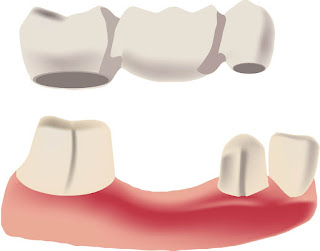Dental Bridges: Advantages and Disadvantages
Usually, after a person has lost or
knocked-out his/her tooth or teeth, the most suggested treatment is by having a
removable prosthetic device like dentures, and dental bridges. A removable
prosthetic device can provide coverage for your lost tooth but since they are
not implanted, they can provide you discomfort and some inferiority functions.
Your dentist, in place of the removable dentures, however can prescribe dental
bridges when you have gaps between teeth.
In having a dental bridge, you must
know that your remaining teeth provides support to the crown. Like having a
porcelain crown, the dental bridge is fabricated by reducing the exterior part
of the teeth by drilling so that it can support the bridgework. An impression
will be taken so that a dental cast or a mould can be build and then send to
the laboratory. The bridge will then arrive from the laboratory and will be
installed on the patient with permanent cement.
Having a missing teeth can cause psychological
and health problems if not treated as soon as possible as this can cause
infection to the neighboring teeth and of course, some periodontal
diseases. The Advantages
of dental bridges are as follows:
1. Prevents movement of remaining teeth
2. Prevents TMJ
3. Improves your biting
4. Improves your speech problems
5. Reduces bone loss risk
6. Reduces periodontal damage and tooth decay
7. Improves self-confidence
8. Can last you 10 years or longer
Many patients having missing teeth
prefer dental bridges compared to dentures and dental
implants as these two are
expensive. But there are disadvantages in having dental bridges this includes:
1. Since they are not removable, they are more
difficult to maintain
2. Some of the natural surrounding teeth will be
removed for the placement of dental bridges
3. Although they last for several years, they
still need to be replaced
4. Some experience tooth pain and sensitivity
after the treatment




Comments
Post a Comment